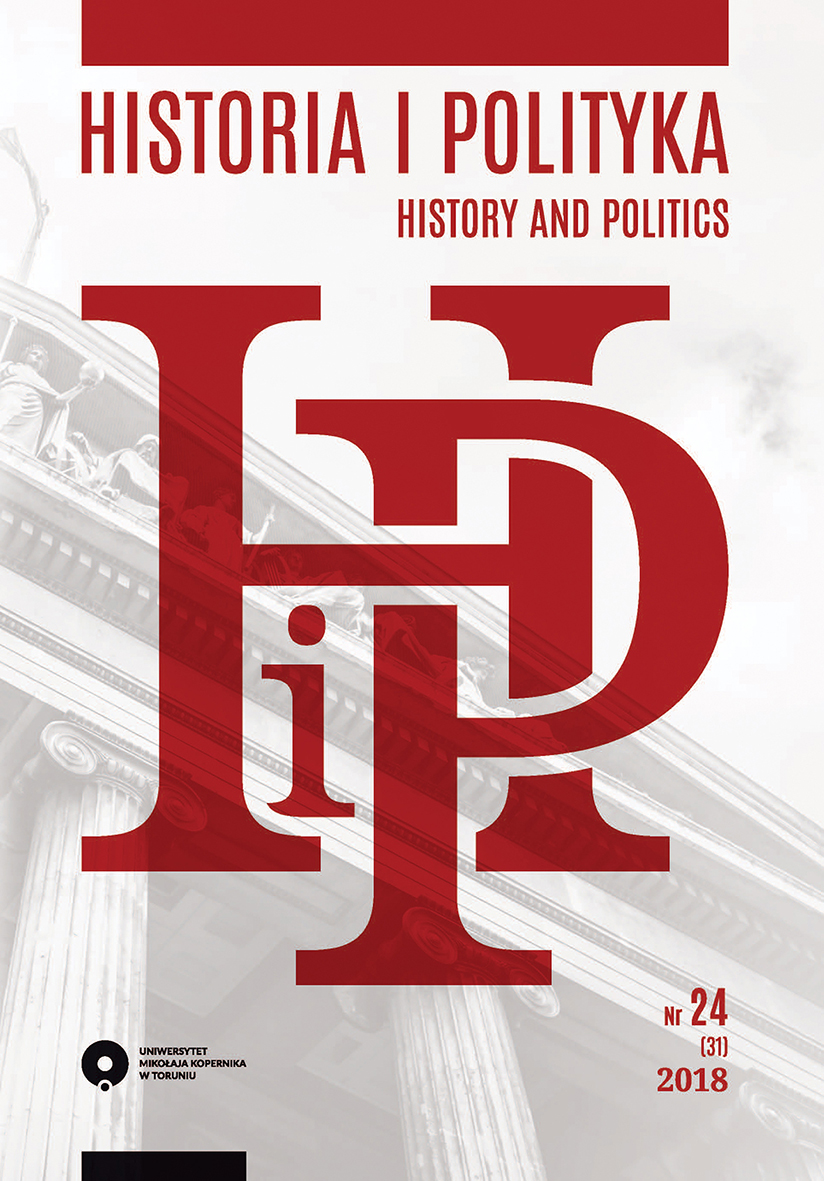Balkan Geostrategic Vector of the Russian Federation
DOI:
https://doi.org/10.12775/HiP.2018.013Słowa kluczowe
Russia, Balkan countries, Yugoslavia, Balkan crisis, destabilization, confrontationAbstrakt
Russia’s policy concerning the Balkan countries is discussed in this article. It is substantiated that the countries of Southeastern Europe have long been one of the key places in Russian geostrategy. Since the 1990s Russia has been trying to take an active part in resolving the Balkan crisis, in particular in the preparation of the road map for resolving the ethnic conflict in Bosnia and Herzegovina. However, seriously confronting the bombing of Belgrade by the NATO coalition in 1999, during the Kosovo War, was impossible for Russia due to its intra-political crisis and the weakness of its geopolitical status. Today, Russia is betting not on “soft power”, but primarily on the destabilization of the regional security system and the transitory (transitional) world order in general. The Balkan region itself is one of those that seeks to undermine the stability of individual countries that could potentially become part of the Euro-Atlantic structures. In case of an aggravation of the situation, Russia will traditionally support its allies – first of all, Serbia and its ethnic population, who live compactly in the post-Yugoslav area. In general, countries such as Serbia, Macedonia, Albania and Montenegro risk turning into a new field of geopolitical confrontation in Europe between Russia and the United States.Bibliografia
Abashidze, A., Solntsev, A. (2010). Balkany – akhillesova piata evro-atlanticheskoi bezopasnosti. K 15-letiiu Deitonskikh soglashenii. Retrieved from: http://www.observer.materik.ru/observer/N8_2010/057_065.pdf.
Arbatova, N.K. (2005). Natsional’nye interesy i vneshniaia politika Rossii: evropeiskoe napravlenie (1991–1999). Moskva: IMEMO RAN.
Averre, D. (2009). From Pristina to Tskhinvali: The Legacy of Operation Allied Force in Russia’s Relations with the West. International Affairs, 3, 575–591.
Baranovskii, V. (1999). Kosovo. Rossiiskie interesy slishkom znachitel’ny. Mezhdunarodnaia zhizn’, 6, 34–46.
Bechev, D. (2016). Who’s Playing Whom? The American Interest. Retrieved from: http://www.the-american-interest.com/2016/09/25/who-is-playing-whom/.
Bershidsky, L. (2015). Macedonia, the New U.S.-Russia Battlefield. Retrieved from: https://www.bloomberg.com/view/articles/2015-05-19/macedonia-the-latest-u-s-russia-battlefield.
Board, A. (2016). Beware: The Russian Bear is Getting Bolder. The Washington Post. Retrieved from: https://www.washingtonpost.com/opinions/global-opinions/beware-the-russian-bear-is-getting-bolder/2016/12/01/5f8535ae-b738-11e6-a677-b608fbb3aaf6_story.html?utm_term=.6c4e51b3ad71.
Bogaturov, A.D. (2007). Tri pokoleniia vneshnepoliticheskikh doktrin Rossii. Retrieved from: http://www.intertrends.ru/thirteen/005.htm.
Chernogoriiu ofitsial’no priniali v NATO. (2017). Retrieved from: https://censor.net.ua/news/442837/chernogoriyu_ofitsialno_prinyali_v_nato.
Erman, G. (2016). Proval perevorota v Chernogorii: Zapad sryvaet plany Rossii. Retrieved from: http://news.liga.net/articles/world/13365205-proval_perevorota_v_chernogorii_zapad_sryvaet_plany_rossii.htm.
Gus’kova, E. (2005). Makedonskii vopros. SShA i albantsy khotiat pokonchit’ s vliianiem Rossii na Balkanakh. Retrieved from: http://www.fondsk.ru/news/2015/06/02/makedonskij-vopros-usa-i-albancy-hotjat-pokonchit-s-vlijaniem-rossii-na-balkanah-33638.html.
Haas, M. (2010). Russia’s Foreign Security Policy in the 21st Century Putin, Medvedev and Beyond. London–New York: Routledge.
Is Russia Showing Special Interest in Macedonia? (2015). Retrieved from: http://www.slobodnaevropa.org/a/is-russia-showing-special-interest-in-russia/26919885.html.
Koval’, O. (2015). NATO і Rosіia pochali bіi za Chornogorіiu. Dzerkalo tizhnia. Retrieved from: http://gazeta.dt.ua/international/nato-i-rosiya-pochali-biy-za-chornogoriyu-_.html.
Krastev, І. (2015). The Balkans are the Soft Underbelly of Europe. Financial Times. Retrieved from: https://www.ft.com/content/2287ba66-8489-11e4-bae9-00144feabdc0.
Macedonia: A Pawn in the Russian Geopolitical Game? (2015). Retrieved from: http://www.dw.com/en/macedonia-a-pawn-in-the-russian-geopolitical-game/a-18476013.
Mearsheimer, J. (2014). Why the Ukraine Crisis Is the West’s Fault. The Liberal Delusions That Provoked Putin. Foreign Affairs, 5. Retrieved from: https://www.foreignaffairs.com/articles/russia-fsu/2014-08-18/why-ukraine-crisis-west-s-fault.
Parlament Chornogorії pіdtrimav vstup do NATO. (2017). Retrieved from: http://www.ukrinform.ua/rubric-abroad/1885320-parlament_chornogoriii_pidtrimav_vstup_do_nato_2096256.html.
Politika Rossii na Balkanakh. (2012). Retrieved from: http://voprosik.net/politika-rossii-na-balkanax/.
Pop, V. (2015). Macedonia Becomes Latest Stage for Russian Tensions With the West. The Wall Streat Journal. Retrieved from: http://www.wsj.com/articles/macedonia-becomes-latest-stage-for-russian-tensions-with-the-west-1433202972.
Primakov, E.M. (1999). Gody v bol’shoi politike. Moskva: Kollektsiia «Sovershenno sekretno».
Putin gotovit voinu na Balkanakh. (2016). Retrieved from: https://charter97.org/ru/news/2016/9/26/224293/.
Torba, V. (2016). Fіnіshna priama Chornogorії do NATO. Retrieved from: http://day.kyiv.ua/uk/blog/polityka/finishna-pryama-chornogoriyi-do-nato.
Trukhachev, V. (2009). Rossiiskii desant v Kosovo mog izmenit’ istoriiu. Retrieved from: http://www.pravda.ru/world/europe/balkans/12-06-2009/313738-kosovo-0/.
Trukhachev, V. (2012). Prizrak albanskogo poboishcha v Makedonii. Retrieved from: http://www.warandpeace.ru/ru/reports/view/67869/.
V Kremle rasskazali o posledstviiakh vstupleniia Chernogorii v NATO. (2016). Retrieved from: https://lenta.ru/news/2016/05/20/montenegro_kremlin/.
Zadorozhnyi, A. (2015). “Rossiia – v pervoi «troike» po geopolitike i voennoi sile, v «desiatke» po ekonomike, v drugom gorazdo slabee”. Retrieved from: https://www.znak.com/2015-12-30/vrazhda_s_ukrainoy_i_turciey_nadolgo_skoro_mozhet_vzorvatsya_afganistan.
Pobrania
Opublikowane
Jak cytować
Numer
Dział
Licencja
Uniwersytet Mikołaja Kopernika w Toruniu respektuje prawo do prywatności i ochrony danych osobowych autorów.
Dane autorów nie są wykorzystywane w celach handlowych i marketingowych. Redaktorzy i recenzenci są zobowiązani do zachowania w poufności wszelkich informacji związanych ze złożonymi do redakcji tekstami.
Autor, zgłaszając swój tekst wyraża zgodę na wszystkie warunki i zapisy umowy licencyjnej (określającej prawa autorskie) z Uniwersytetem Mikołaja Kopernika w Toruniu.
Statystyki
Liczba wyświetleń i pobrań: 324
Liczba cytowań: 0



